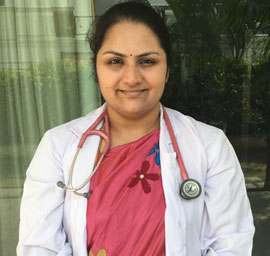Premenstrual syndrome commonly referred to as PMS is a physical and emotional factor which happens in a woman’s menstrual cycle before her period. Symptoms often vary between women and resolve around the start of menstrual cycle.

Common symptoms include acne, tender breasts, bloating, fatigue or tiredness, irritability, mood changes. These symptoms (one or more) may last for 6 days prior to the cycle. These symptoms do not occur during pregnancy or after menopause.
Causes:
• High salt diet
• Alcohol
• Caffeine
• Stress
• Unknown
• Typically, reducing salt, caffeine, stress and exercising will help women who have mild symptoms. Calcium and Vitamin D supplements are useful for some women. Anti inflammatory drugs will help in women who have physical symptoms.
• Up to 80% of women report having symptoms prior to menstruation. A rare entity called Premenstrual Dysphoric Disorder (PMDD) is a more severe form of PMS affecting 3-8% of women having psychological symptoms. In such cases, anti depressants will be useful.
Symptoms:
More than 200 symptoms have been noted in PMS, of which these are common:
- Stress
- Anxiety
- Difficulty to sleep
- Headache
- Tiredness
- Mood swings
- Increased emotional sensitivity
- Changes in interest in sex
- Bloating
- Lower back pain
- Abdominal cramps
- Constipation
- Diarrhea
- Breast tenderness
- Cyclic acne
- Joint and tendon pain
- Food cravings
What causes PMS?
PMS is usually linked to hormonal changes especially in the luteal phase which is the second half of the menstrual cycle. Chemical changes in the brain, stress, emotional problems and depression make the PMS worse although they are not the cause of PMS. Low levels of vitamins and minerals, high sodium, alcohol, caffeine exacerbate the symptoms.
How do we diagnose?
Basically the diagnosis is made by the symptoms which the woman presents with, although these symptoms appear normal for many women. Nevertheless treatment should be offered to women who cannot carry out their routine work.
All PMS cannot be just hormonal. There could be some underlying medical condition which could be aggravating the PMS.
Consult your doctor if you have the following:
- Anemia
- Hypothyroidism
- Eating disorder
- Substance abuse
- Depression
- Affective disorders
- Migraine
- Seizure disorder
- Irritable bowel syndrome
- Asthma
- Allergies
- Dysmenorrhea (pain during or before menstruation)
- Endometriosis
- Perimenopause (nearing menopause)
National Institute of Mental Health Research states that the intensity of these symptoms from cycle days 5-10 before menstruation is referred to as PMS. This pattern must be seen in at least 2 consecutive cycles to diagnose it as PMS.
Treatment:
Many treatment options have been tried. All of them include symptomatic treatment. Some of the treatment options include:
- Reducing salt
- Calcium supplementation
- Vitamin D supplementation
- Anti inflammatory drugs
- Diuretics
- Oral contraceptive drugs in significant symptoms
- Anti depressants
- Progesterone
- Vitamin B6
- Vitamin E
- Evening primrose oil
- Soy

Article by Dr. Divya Raghavendra Rao, M.B.B.S, M.S (Obstetrics & Gynecology)
Consultant Obstetrics & Gynecology
Kauvery Hospital, Chennai

